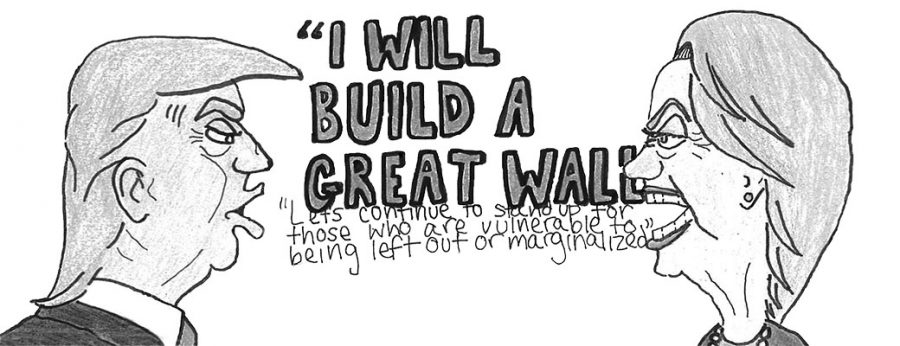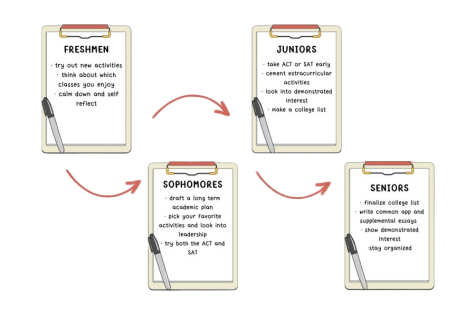Candidates bring brash rhetoric to the election
While both candidates have unusual campaigns, Trump spews especially offensive remarks
Credit: Olivia Weinberg
September 21, 2016
In this year’s presidential election, campaign jargon has been far from presidential—especially from the camp of Donald Trump. In the battle for the Oval Office, he is not fighting using superior policy as his primary weapon, but brazen personal slams instead.
Rather than attempting to prove himself a better candidate than Carly Fiorina by critiquing her policy for example, he critiqued her physical appearance. “Look at that face! Would anyone vote for that?” he commented, continuing to say: “I mean, she’s a woman, and I’m not s’posedta say bad things, but really, folks, come on. Are we serious?” Similarly, when Megyn Kelly posed a question to Trump in the first Republican debate addressing his personal slams toward women, he took to Twitter calling her “not very good or professional.” He then encouraged his supporters to attack her by retweeting their similarly hateful tweets.
Unlike most politicians, he did not tiptoe around his controversial comments toward Megyn Kelly which some would go to great lengths to explain or excuse. He did not attempt to rectify the situation with an official statement showing his support for women or sincere regrets about his remarks. Instead, he fueled the fire among his supporters and solidified his reputation; he turned the female moderator who called him out for his bullying into his next victim.
While Trump’s unusual strategy was risky as it had potential to isolate the groups targeted by these remarks (women, Muslims, people with Mexican heritage), it paid off for a while. It provided Trump with tremendous free media coverage and the memorable persona of someone who would unabashedly shake up politics without the careful filter of someone who only said what their campaign manager advised them to.
As the candidate pool has narrowed down to just Donald Trump and Hillary Clinton, however, Trump’s strategy has proven unfit for the primaries. During the general election, this strategy successfully propelled him from a surprising candidate to an established name, and ultimately the official Republican nominee. Now, however, the fire he fuels is Clinton’s campaign. Trump’s vast media attention and frequent controversies throughout this election allowed headlines about Clinton’s email scandals to often be adjacent to headlines about Trump’s shortcomings.
Moreover, Trump’s attractiveness largely came from his aforementioned transparency, his refusal to succumb to the “peer pressure” of politics, and his success as a businessman amid the turmoil and strife in our economy.
Since Trump did not release his taxes as many Americans requested, the transparency that was a hallmark of his campaign has been discredited. Now, all that is left of Trump are the comments that offended large groups of people and forced many to question his ability to practice the diplomacy required of POTUS. No longer can they be packaged as honest thoughts of a man whose priority was for the American public to know exactly who he is, blemishes and all. Now, they are simply offensive and appalling thoughts of someone who does not have the careful filter of a politician, but simply has no filter at all.
His refusal to release his taxes also raises questions about his business success and how he amassed his fortune. His reluctance to release documents that could further legitimize his tremendous wealth is mysterious and unnerving, especially to voters who laud his transparency.
The election thus far has not been primarily focused on policy, which has allowed Trump’s rhetoric to propel him to the position of the Republicans’ official nominee. As voters realize that Trump’s transparency may be a facade after all and the importance of policy takes center stage again, the tide has shifted in Clinton’s favor.
Sure, this election has been captivating thus far and at times humorous, but as the end is in sight, voters seem exhausted by it all; many voters have been turned off over the course of the election and voter turnout has a bleak projection. As citizens of our nation and advocates of democracy, Americans must not be fazed by the tone of this election. If you do not stand for this type of “politics,” being a passive voter and simply not showing up to the polls is not a good solution. Doing so brings the possibility that the very candidates driving you away from the polls become the leaders of our nation, that the very rhetoric irking you becomes the policies and verses of our president.









